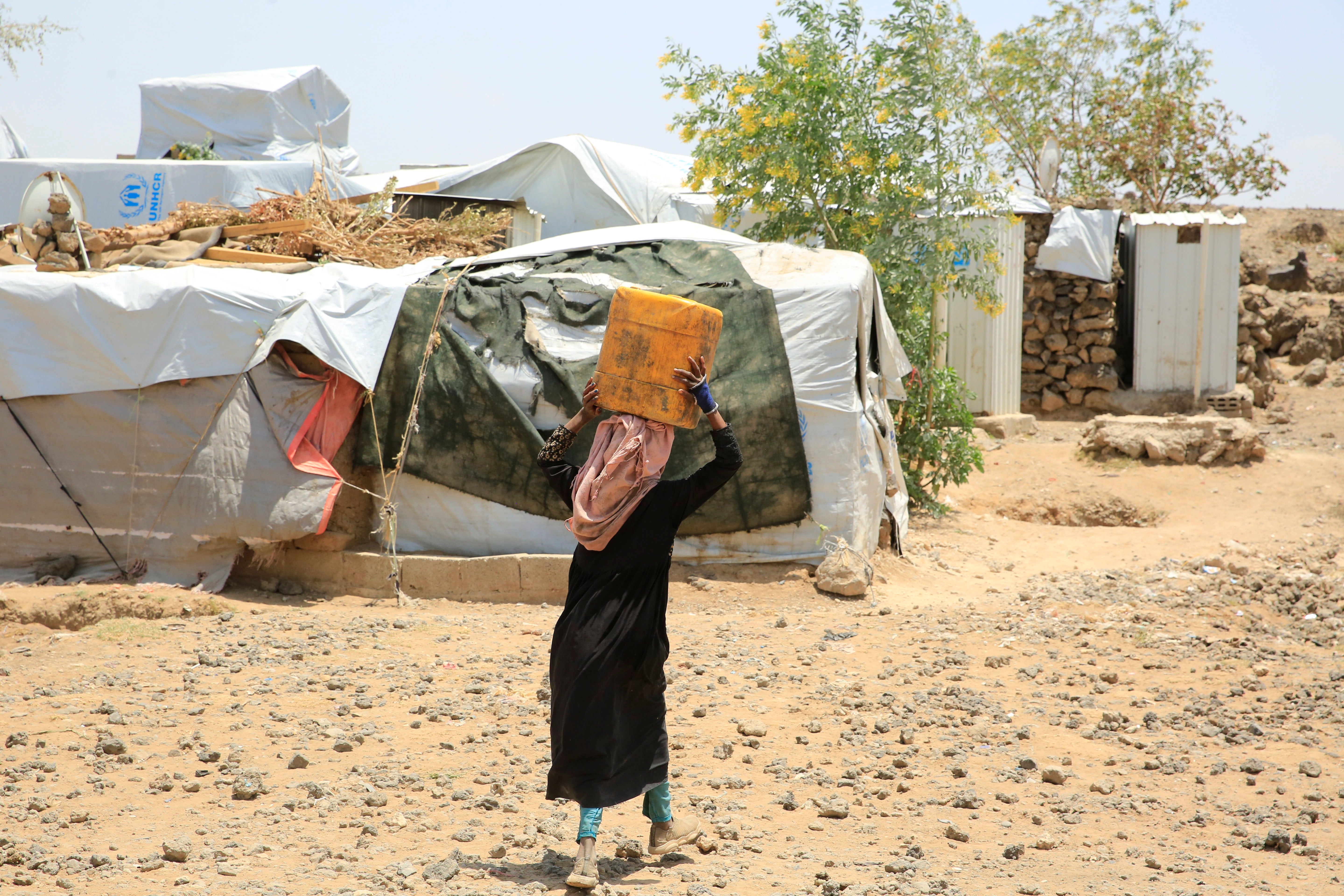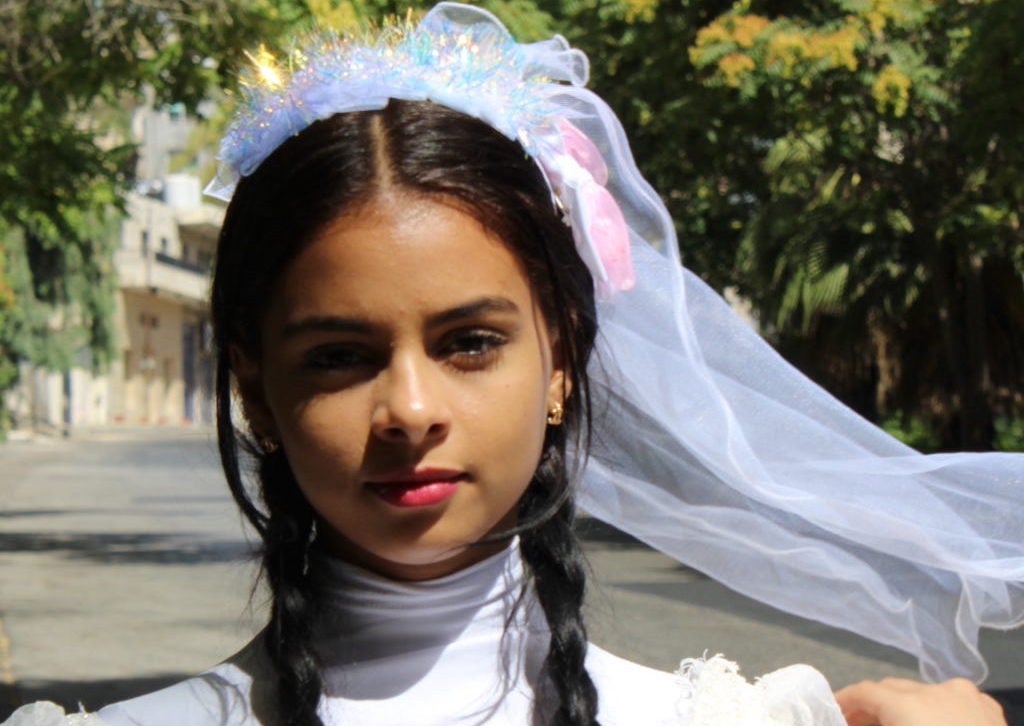‘My brother married me off for the money’: Child marriage rises in Yemen during war
More than 4 million Yemeni girls are child brides as first tradition and now war makes the practice more common, reports Charlene Rodrigues


When Fatimah Ali’s father stopped her from attending school she became withdrawn.
Aged 13, he married her to a 17-year-old man unknown to her, in 2019. A family member speaking to The Independent on condition of anonymity from Dar Al-Sha’ab village in Yemen’s southwestern Ibb region, said she could not shoulder the burdens of marriage.
She found living in a crowded house with a large extended family unbearable. Her husband’s unemployment and their poor financial situation did not help either.
Rejected by her own family and persecuted by her partner’s, she saw no way out. Last year, she ended her life. The relative said the family was following “tradition” and it is not uncommon for girls to marry young in Yemen.
Even before the start of the Saudi bombing campaign in Yemen in 2015, child marriage was historically widespread across the north and the south of the country.
Efforts to criminalise the practice stalled due to the war and over the years early marriage has become even more commonplace, activists and researchers told The Independent. Nearly two-thirds of girls in Yemen are married before the age of 18 and many before 15 years of age, UNFPA representative Nestor Owomuhangi said.
More than 4 million Yemeni girls are child brides and 1.4 million of these are younger than 15, a United Nations Children’s Fund (UNICEF) 2019 report found. Exact data showing a rise in child marriage post-Covid is hard to come by.
A researcher in Houthi-controlled Sana’a who has studied gender-based violence for nearly 15 years and who cannot be named for security reasons, said early marriage has gone up since 2015 for girls and boys.
The reasons for a spike in child marriage are many and intertwined, but displacement is key. Displaced families are vulnerable to violence, extortion, abuse, and poverty.
Fighting between the Iran-backed Houthis and Yemeni government forces, as well as military operations since 2015, has caused the internal displacement of 4.3 million Yemenis.
A UN investigation found that Britain may be complicit in Yemen’s war crimes along with US and France. UK arms export licences to the Saudi-led coalition since the bombing started in March 2015 are officially said to be worth £8.6bn (including £7.1bn to Saudi Arabia alone). Actual numbers are estimated to be much higher.
But the war has also seen the return of Yemeni traditions that were formerly buried. For instance, “exchange marriages” or “shighar” – a popular practice in areas of Afghanistan, Pakistan and India – have increased. According to the custom, a brother and sister from one family marries a sister and brother, respectively, from another.
Some families marry their boys to prevent them from going to the frontline. A lack of access to resources automatically forces families to seek alternative ways to reduce their economic burden in the absence of an income, Mr Owomuhangi said.
In Houthi-run areas, marrying young is a statement of wealth. Among extremist and religious groups, girls are married early to give them a sense of belonging and in poorer agricultural communities, to clear off years of family debt, the researcher said. In Yemeni tradition, when girls marry, the groom’s family pay the bride’s family a sum of money.
While some families believe early marriage is a widely accepted tradition and the right thing to do, for others in extreme poverty, it is one less mouth to feed. Grain and fuel prices have shot up in recent months due to the war in Ukraine. Yemen procures nearly 45 per cent of its wheat imports from both countries.
Mr Owumuhangi said girls married below 12 years of age will not survive the night with a fully grown man. “This can be fatal for her. There would be likely complications at childbirth that can be fatal for the mother and child, or both,” he said, adding that a life spent in servitude could also put her emotional and mental wellbeing at risk.
Fadiyah Mohammed, 12, suffered emotional and physical abuse after her brother, 27, married her to a 45-year man for US$5,000 (£4,200) in 2021. The groom works at an Abaya tailor shop in Hayel Street in the capital and has two older daughters from a previous marriage.
Ms Mohammed’s parents died before the Houthis seized the capital in 2014, and the siblings were raised by one of their relatives. In Yemeni tradition, in the absence of a father, the brother automatically assumes guardianship.
“My brother married me off for the money,” she said.
From a remote village in Madhbah in Yemen’s capital Sana’a, Ms Mohammed told The Independent she suffers from domestic violence and several diseases, including anaemia. Her cousins of a similar age were married off for money, she said.
Her neighbours could not stop the marriage or take action because there are no laws setting a minimum age for marriage. In 1999 Yemen’s parliament abolished article 15 of Yemen’s Personal Status Law, which set the minimum age for marriage at 15 for boys and girls, citing religious reasons. The only legal protection for girls is a prohibition on sexual intercourse until they reach the age of puberty.

Award-winning Yemeni activist Nada Ahdal, 20, fled from her parents’ house in Hodeidah’s Al-Tariba village when she was nearly 10. A video of her condemning the Yemeni custom and exposing her parents’ attempt to marry her twice sparked global outrage. She was detained by Yemen’s interior ministry and al-Qaeda and eventually released.
Ms Ahdal said there is an urgent need to raise awareness of the dangers of child marriage and child trafficking. “Without awareness, the law will be difficult to enforce,” she says.
Ms Ahdal’s family, who initially opposed her campaigning have in recent years supported her and have become activists in her hometown.
“I did not only save my life but my sister’s also. Change takes a long time but with my uncles’ help and with others I eventually convinced them that child marriage is dangerous,” Ms Ahdal said, now pursuing her education in Newcastle. She wants more women to have the opportunity to study.
“We cannot just decide for girls what age they will marry from the day they are born. We need to give them education and skills. In the future, they can decide what they wish to do,” Ms Ahdal said.
We cannot just decide for girls what age they will marry from the day they are born. We need to give them education and skills. In the future, they can decide what they wish to do
UN’s Yemen envoy Hans Grundberg said earlier in June that a renewed two-month truce, which started in April, is a “step towards [a] broader peace deal”.
Ms Ahdal is convinced change can and will happen regardless of whether it takes one day, a week, or a year.
“There are people who support you and people who are against you which is totally understandable. We need to continue,” she said.
Fuad Rajeh contributed to this report
Join our commenting forum
Join thought-provoking conversations, follow other Independent readers and see their replies
Comments
Bookmark popover
Removed from bookmarks